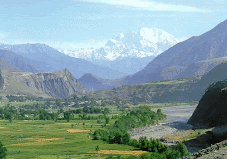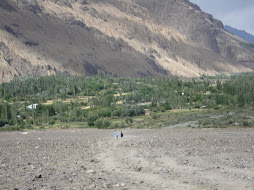DAWN
By Zar Alam Khan
ISLAMABAD, Feb 1: A recent decision of the Federal Directorate of Education (FDE) to repatriate all teachers currently working in the federal government schools in the capital on deputation to their respective provinces or regions after completion of five years has sent a shock wave among the educators, particularly women.
Sources said the FDE was under pressure from ruling politicians to appoint their people and the decision to send back all teachers on deputation was aimed to create vacancies for accommodating the political appointees. So far over 20 teachers have been directed to relinquish work and report back to their respective provinces.
It may be noted that majority of the teachers on deputation are women whose husbands are working in various government departments and private organisations and are posted in the capital. Taking benefit of existing rules facilitating posting of government servants in areas where their spouses lived or worked, hundreds of women from various parts of the country have moved to the capital and some of them have already been regularised by the FDE.
The affected female teachers told Dawn that the move taken by the FDE was arbitrary, anti-women and above all politically motivated. They said on the one hand the PPP government was claiming to be striving for creating job opportunities in the country and was also reinstating sacked government employees but on the other it was taking such steps which would shut the doors of employment on a large number of teachers, especially women.
They said in order to avoid disturbance in their family lives, a large number of women teachers had come to the capital on deputation and now their children were also studying in various educational institutions here. They said due to family constraints, they had sacrificed a number of allowances and other job benefits which they were otherwise entitled to and had been working on the same scale without promotion because as long as they are on deputation they are not included in the seniority list.
“Sending us back to our provinces would mean an end to our careers, because we will not be in a position to go to our areas leaving our children back here,” they added.
They said the new director-general of the FDE, a senior joint secretary at the Ministry of Education, had no authority to take such a decision because it was against rules under which government employees were entitled to get themselves posted in areas where their spouses worked.
They said earlier the facility was available only to those employees whose spouses were also in government jobs. But in 2006, through a special notification titled “Posting of married female government servants at the place of residence/posting of their husbands who are not in government employment”, the federal government also extended the facility to those employees whose spouses worked in the private sector.
The notification dated April 21, 2006, says, “Keeping in view the socio-economic problems and hardships faced by husbands and wives in government service due to posting at different stations of duty, the Establishment Division issued instructions/guidelines vide its O.M. No 10/30/97-R-2, dated 13.5.1998 and 17.12.1999 to facilitate posting of husbands and wives at the same station and the posting of unmarried female civil servants at the place of residence of their parents/families. With a view to also facilitate those female government servants whose spouses are not in government service or working in private sector or are unemployed, it has been decided to extend the facility to this class of government servants too to enable them to serve at the residence of their spouses irrespective of whether such spouses are employed with the government, private sector or even unemployed.”
The teachers said under the existing rules, after completion of five years of deputation teachers were regularised depending on their performance. They said this gave the teachers a chance to spend the remaining period of their service with their families and also motivated them to improve their performance. As a result, majority of the teachers on deputation showed 100 per cent result. They said during the summer vacation last year, about 20 teachers on deputation were regularised by the FDE.
They said if implemented the new decision would put the professional future of a large number of women at risk. They called upon the president, the prime minister and the federal minister for education to restrain the FDE from taking the unilateral decision and save the teachers from mental trauma which the move had caused to them.
When contacted, a spokesman for the FDE, however, clarified that power to extend the deputation period after five years rested with the Establishment Division. He said even after completion of three years’ deputation, further extension was granted by the secretary education. Under the existing rules, he added, maximum period for deputation was five years. After completion of this period, the FDE sends the summary for further extension to the Establishment Division from where it goes to the prime minister for final approval. He said in some recent cases the Establishment Division had turned down the FDE requests seeking extension in the deputation period of teachers.
About absorption after the five-year deputation period, the spokesman said this policy was applied only to teachers in scales 9 and 14 depending on the availability of seats against the deputation quota and the teacher’s satisfactory performance.
Subscribe to:
Post Comments (Atom)
Awesome and rugged

Beauty of Chitral

Kishmanja, a beautiful village in Yarkhun valley
Lush green

DIZG: threatened by floods

The legendary village of Ayun in Chitral

On way to Bumburet
Dizg, Yarkhun

Blog Archive
-
▼
2009
(152)
-
▼
February
(52)
- Lowari Tunnel to help tap mineral resources in Chi...
- PML-N Chitral protests disqualification of Sharif ...
- Chitralis & Nizam-e-Adl - Letter
- Chitrali passenger kidnapped in Afghanistan
- Chitralis and Nizam-e-Adl regulation - Letter
- Nizam-e-Adl and Chitralis - Letter
- SHOs reshuffled in Chitral
- Chitral lawyers boycott courts
- Woman attempts suicide in Broze, Chitral
- Outgoing EDO (education)'s services hailed
- Prepardness to meet calamities stressed
- Cash awards announced for grid station workers in ...
- Discrimination in selection for media award
- Chitralis not happy with Taliban's Nizam-e-Adl - L...
- Condolence messages
- Jobless paramedics on hunger strike in Chitral
- Chitralis happy without Nizam-e-Adl
- Haji Lal's death condoled
- Chitral's wetland resources highlighted
- Condolence
- Obituary
- Leaders' rivalry costs Chitral dearly
- MNA says Rs70 million projects for Chitral approved
- Relief supplies for Yarkhun, Laspur valleys demanded
- Revisiting the history of Chitral - 1
- Drosh hospital a picture of complete neglect
- Afghan govt detains Chitral trucks
- Making Chitral Bazaar a Hyde Park in winter
- Four including three of a family killed in Yarkhun...
- Markhor population swells in Chitral
- Skill development for women stressed
- Another suicide case in Chitral
- Locals protest denial of promised jobs in Golen Go...
- Khowar dictionary launched
- Hajis irked by poor arrangements
- Chitrali youth murdered in Taxila
- Health, education sectors top govt’s priority list...
- All-parties moot demands opening of Lowari Tunnel
- Chitral-Ishkashem highway - Letter
- Four killed by stray dogs in Arandu
- Train through Lowari Tunnel opposed
- Woman commits suicide in Chuinj
- New Zakat chairman for upper Chitral
- Gas-fired 320 MW power plant for Pakistan
- Chitral receives fresh rain, snowfall
- Chitral-Shikashim Highway
- Education with a difference
- Convention to take up Lowari tunnel issue
- Another Chitrali killed in Swat
- High LPG, milk prices in Chitral
- World Wetland Day Observed in Chitral
- FDE’s decision to repatriate teachers to home prov...
-
▼
February
(52)
About Me

- Zar Alam Khan Razakhel
- Village Dizg, Yarkhun valley, Chitral, Pakistan
- I blog at http://chitraltoday.net (ChitralToday) about Chitral, its people, culture, traditions and issues. I have been writing about Chitral since 2000. Chitral is a scenic valley in the extreme north-west of Pakistan.
No comments:
Post a Comment